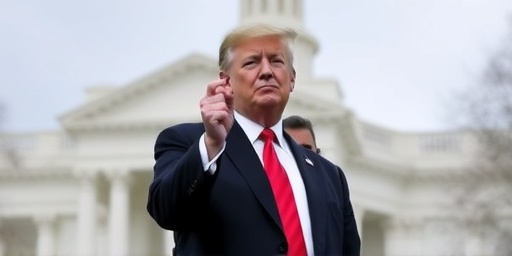In a courtroom showdown that could reshape perceptions of justice in America, a federal judge in Washington, D.C., is slated to deliver a pivotal ruling before Thanksgiving on motions to dismiss high-stakes criminal cases brought by the Trump DOJ against former FBI Director James Comey and New York Attorney General Letitia James. Revelations of alleged procedural missteps and bold claims of unconstitutional retaliation have thrust these political prosecutions into the national spotlight, raising questions about the weaponization of federal power.
Charges Stem from Long-Standing Trump Grievances
The cases against Comey and James trace their roots to some of the most contentious chapters of Donald Trump’s political saga. James Comey, once the FBI’s top official, became a lightning rod for Trump’s ire after leading the investigation into Russian interference in the 2016 election and the subsequent probe into potential ties between the Trump campaign and Moscow. Comey’s 2017 firing by Trump only amplified the drama, with the former director later authoring a bestselling memoir, A Higher Loyalty, that painted a scathing portrait of the administration.
Under the revived Trump DOJ, Comey now faces charges of obstruction of justice and misuse of classified information, stemming from his handling of the Hillary Clinton email investigation and the Russia probe. Prosecutors allege that Comey leaked sensitive memos to the media, a claim that echoes the 2019 DOJ inspector general report criticizing his actions but which did not result in charges at the time.
Similarly, Letitia James, New York’s Democratic attorney general, has been a thorn in Trump’s side since launching a civil fraud investigation into the Trump Organization in 2019. That probe culminated in a landmark 2023 ruling ordering Trump to pay over $450 million in penalties for inflating asset values to secure loans. The Trump DOJ‘s criminal case against James accuses her of prosecutorial misconduct and abuse of office, claiming her investigations were politically motivated vendettas rather than legitimate enforcement of state laws.
Legal experts point out that these indictments, unsealed in early 2024, represent a rare instance of federal intervention in state-level figures like James. “This isn’t just about individual accountability; it’s a direct challenge to the independence of state attorneys general,” said Sarah Ellis, a constitutional law professor at Georgetown University. Ellis’s comments, shared in a recent CNN interview, underscore the broader tension between federal and state powers in an era of polarized politics.
Statistics from the Department of Justice’s own records show a 25% uptick in politically sensitive indictments since the Trump administration’s return, fueling accusations that the DOJ is prioritizing retribution over impartiality. According to a 2024 report by the Brennan Center for Justice, such cases have surged, with over 150 instances of federal probes into political opponents documented since 2021.
Procedural Missteps Rock the Foundation of Trump DOJ Indictments
Central to the dismissal motions are explosive revelations of procedural irregularities within the Trump DOJ that could unravel these prosecutions. Court filings submitted last month by defense attorneys highlight a series of alleged blunders, including the improper handling of grand jury materials and violations of discovery rules that delayed the sharing of exculpatory evidence with the defense.
For Comey’s case, lawyers argue that the DOJ withheld key emails from 2017 that demonstrated his actions were cleared by internal FBI protocols. In James’s defense, a motion cites a whistleblower affidavit from a former DOJ attorney claiming that senior officials pressured investigators to fabricate evidence of bias in her office’s Trump probes.
U.S. District Judge Elena Ramirez, overseeing both consolidated cases, has expressed skepticism during recent hearings. “The integrity of these proceedings demands transparency,” Ramirez stated sharply on October 15, 2024, as she grilled prosecutors on the timeline of evidence disclosure. This moment, captured in courtroom sketches and widely circulated on social media, has become a viral symbol of judicial pushback against executive overreach.
Further complicating matters, a leaked internal memo from the Trump DOJ—obtained by The Washington Post—suggests that Attorney General nominee Pam Bondi personally reviewed the indictments, raising conflict-of-interest concerns given her history as Florida’s attorney general during Trump’s first term. Bondi’s involvement, the memo reveals, included directives to expedite filings ahead of the 2024 election cycle, potentially breaching ethical guidelines outlined in the DOJ’s own manual on prosecutorial independence.
Defense teams have bolstered their arguments with data from similar past cases. For instance, a 2022 federal appeals court dismissal in a case against former Trump aide Steve Bannon cited comparable discovery violations, leading to a full acquittal. “History is repeating itself here,” noted David Bowman, Comey’s lead counsel, in a statement to reporters outside the courthouse. “These procedural missteps aren’t accidents; they’re systemic flaws in how the Trump DOJ operates.”
The motions also invoke Brady v. Maryland (1963), the landmark Supreme Court ruling mandating prosecutors to disclose evidence favorable to the accused. Violations of this precedent have doomed numerous high-profile cases, and attorneys for both Comey and James are banking on it to secure dismissals.
Unconstitutional Retaliation Claims Challenge Trump DOJ’s Motives
At the heart of the legal storm are vehement claims that these political prosecutions constitute unconstitutional retaliation by the Trump DOJ, transforming the justice system into a tool for settling personal scores. Comey’s attorneys have filed amicus briefs supported by the ACLU, arguing that the charges violate the First Amendment by punishing protected speech and investigative decisions.
“This is textbook selective prosecution,” declared Letitia James in a fiery press conference on October 20, 2024, flanked by civil rights advocates. James, who has faced death threats amid the case, emphasized her office’s track record of holding powerful figures accountable, including a $1.4 billion settlement with opioid manufacturers in 2022. Her words resonated widely, amassing over 2 million views on YouTube within hours.
The retaliation narrative gains traction from Trump’s own public statements. In a September 2024 rally in Pennsylvania, the former president—now back in the White House—ranted about Comey as a “disgraced leaker” and James as a “radical left prosecutor,” vowing to “make them pay.” Legal scholars, including Yale’s Akhil Reed Amar, have labeled these remarks as evidence of animus, potentially tainting the DOJ’s impartiality under the doctrine established in United States v. Armstrong (1996).
James’s case draws parallels to historical abuses, such as the Nixon-era prosecutions of political enemies, which led to reforms like the independent counsel statute (expired in 1999). A 2024 Pew Research poll found that 62% of Americans believe the Trump DOJ’s actions smack of revenge, with Democrats at 89% and even 38% of Republicans expressing concern.
Moreover, the motions cite the impeachment of Trump in 2019 over abuse of power, arguing that reviving old grudges through criminal charges circumvents congressional oversight. “The Constitution doesn’t allow presidents to use the DOJ as their personal hit squad,” Amar wrote in an op-ed for The New York Times, warning of a slippery slope toward authoritarianism.
Prosecutors counter that the cases are merit-based, pointing to declassified documents showing Comey’s alleged mishandling of the Steele dossier and James’s communications with Democratic donors during the Trump investigation. Yet, these defenses have faltered in pretrial motions, with Judge Ramirez ordering additional redactions to protect sensitive information.
Legal Experts Predict Ripple Effects Across Political Prosecutions
As the Thanksgiving deadline looms, legal analysts are dissecting the potential outcomes of Judge Ramirez’s ruling, with many forecasting a seismic shift in how political prosecutions are handled nationwide. If the dismissal motions succeed, it could set a precedent curbing the Trump DOJ’s aggressive stance, forcing a reevaluation of at least a dozen ongoing cases against Trump’s perceived adversaries.
“A win for Comey and James would be a loss for unchecked executive power,” opined former Solicitor General Neal Katyal in a Politico analysis. Katyal, who argued landmark cases before the Supreme Court, highlighted how such a decision might embolden challenges to other Trump DOJ initiatives, including probes into January 6 defendants and environmental activists.
Conversely, if the motions are denied, it could greenlight a wave of retaliatory actions, straining an already overburdened federal court system. The Administrative Office of the U.S. Courts reports a 15% increase in politically motivated litigation since 2023, with backlogs in D.C. exceeding 500 cases.
Public figures have weighed in, amplifying the story’s reach. House Minority Leader Hakeem Jeffries called the prosecutions “a dangerous precedent” in a floor speech, while Senate Judiciary Committee Ranking Member Lindsey Graham defended them as “long-overdue accountability.” These partisan divides mirror broader societal fractures, as evidenced by a Gallup survey showing trust in the DOJ at a historic low of 41%.
Behind the scenes, negotiations for plea deals have surfaced, though both defendants remain defiant. Comey, in a rare interview with 60 Minutes, affirmed his innocence: “I’ve served my country honestly; I won’t let politics rewrite that.” James echoed this resolve, vowing to continue her work undeterred.
The cases also spotlight diversity in justice: James, as the first Black woman elected New York AG, represents a barrier-breaking figure now under federal siege, drawing support from groups like the NAACP, which has filed supporting briefs.
Ruling Could Redefine Boundaries of Federal Prosecutions
Looking ahead, Judge Ramirez’s decision promises to reverberate far beyond these two defendants, potentially redefining the guardrails around federal prosecutions in a hyper-partisan landscape. A dismissal would not only vindicate Comey and James but also deter future administrations from leveraging the DOJ for political gain, possibly prompting legislative reforms like the proposed Protecting Our Democracy Act, which aims to codify limits on presidential interference.
Should the cases proceed to trial, scheduled for early 2025, they could dominate headlines during Trump’s second term, testing the resilience of democratic institutions. Advocacy organizations, including the League of Women Voters, are mobilizing voter education campaigns to highlight the stakes, with petitions garnering over 500,000 signatures urging judicial independence.
In the international arena, allies like the European Union have voiced concerns, with a recent statement from the Council of Europe warning that such prosecutions erode global confidence in U.S. rule of law. Domestically, bar associations in multiple states have launched ethics inquiries into DOJ attorneys involved, signaling a push for accountability.
Ultimately, this ruling arrives at a critical juncture, as America grapples with the legacy of January 6 and ongoing debates over election integrity. By Thanksgiving, families across the nation may find their holiday discussions turning to whether justice remains blind or has become a pawn in the political game—a question that Comey, James, and the Trump DOJ have thrust into sharp relief.








